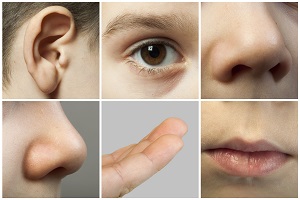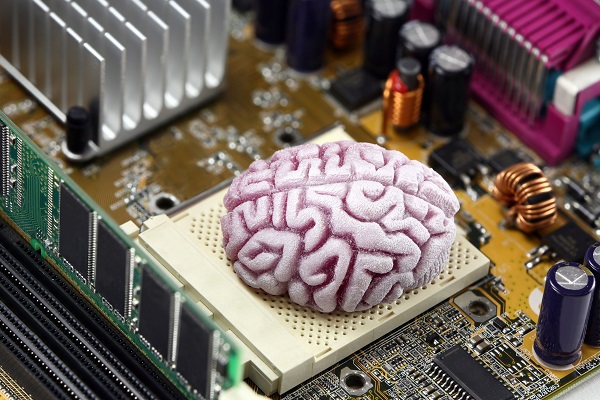18 Feb Insanity, Perception and Consciousness
 Have you ever heard voices, seen people and things others can’t see, perceived colors, sounds or sensations that weren’t really there? The human mind has amazing abilities, sometimes giving us more output than is present in the input. Is this insanity, creativity or a fluke? I can’t answer these questions in this blog, but as we seek models for sentient computing, these are valid questions.
Have you ever heard voices, seen people and things others can’t see, perceived colors, sounds or sensations that weren’t really there? The human mind has amazing abilities, sometimes giving us more output than is present in the input. Is this insanity, creativity or a fluke? I can’t answer these questions in this blog, but as we seek models for sentient computing, these are valid questions.
The eyes, the ears, the organs of taste and smell, the skin, and the kinesthetic sensory mechanisms — all participate in regulating consciousness. Independently and in cooperation, they form integral parts of the definition of consciousness and support mindfulness. Arousal can be considered a heightened state of consciousness. Since the term arousal has been applied to certain states that occur during sleep, one must either concede that sleep is a conscious state, that arousal has conscious and unconscious manifestations, or that there are different levels or states of consciousness. I sometimes awaken with a vivid recollection of a dream. I’m not sure how asleep I am during such dreams, but my awakening usually ends the dream. This is enough for me to assume that the computational model that most closely approximates human brain functions will have multiple levels of consciousness.
| Understanding Context Cross-Reference |
|---|
| Click on these Links to other posts and glossary/bibliography references |
|
|
|
| Prior Post | Next Post |
| Call in the Reinforcements | Dichotomy vs. Continuum |
| Definitions | References |
| perception consciousness | Shakespeare: Richard II |
| brain modeling | Tom Clancy |
| input dualism | George R.R. Martin |
| empiricism | Dichotomistic |
What happens to consciousness when the senses are deprived? A great place to read about sensory deprivation is in Tom Clancy’s The Cardinal of the Kremlin. In this story, a hapless young woman is unresponsive to direct interrogation techniques, so the fictitious KGB interrogator subjects her to an extended suspension in a sensory deprivation chamber. The graphic depiction of this technique for breaking the human spirit is chilling. George R. R. Martin plays similar mind games with one of his captives in a small cave in a sheer cliff with a slanted floor and a certain-death edge. Nothing is available to the victim’s senses except the danger. A less oppressive punishment than a sensory deprivation chamber is the kind of sensory deprivation described by Shakespeare. Because Richard II is able to produce replacements for sensory input, his brain keeps functioning.
 Even in cases of extreme sensory deprivation, such as imprisonment in a medieval dungeon, people can produce replacements for sensory input and thus keep their brains active and sharp. Shakespeare’s King Richard II affords an example. While imprisoned, Richard’s creative juices let him create an intra-consciousness with which he ultimately defeats insanity:
Even in cases of extreme sensory deprivation, such as imprisonment in a medieval dungeon, people can produce replacements for sensory input and thus keep their brains active and sharp. Shakespeare’s King Richard II affords an example. While imprisoned, Richard’s creative juices let him create an intra-consciousness with which he ultimately defeats insanity:
My brain I'll prove the female to my soul My soul the father; and these two beget A generation of still-breeding thoughts, And these same thoughts people this little world In humours like the people of this world.
(Shakespeare: Richard II, Act V, Sc.V)
Without such replacement input, a person’s consciousness can deceive and delude them, a state commonly referred to as insanity.
Brain States
If consciousness is a global or cultural phenomenon, is the mind a shared cosmic collective that encompasses all of us? I’ll revisit this in a future post. In regards to the recurring question of mind/brain dualism: How could we prove that consciousness transcends the brain as a single organ? A proof may look something like this:
——————————————————————–
IF one can show a typical range of states the brain enters during consciousness, and one can also show a typical range of states the brain enters during unconscious states such as sleep – THEN
IF one can show the brain in a characteristically conscious state of activity when the subject is empirically not conscious (empirically means that the observer and the subject concur upon later examination that, during the time of observation, the subject was not conscious); AND
IF one can show the brain in a characteristically unconscious state of activity when the subject is empirically conscious – THEN
==> Consciousness is a phenomenon that involves one or more other physical mechanisms in addition to the brain.
——————————————————————–
Empirically, you may find this proposition believable. Until further research proves this proposition true or false, you must decide for yourself. For me, I choose to assign the task of maintaining a running context to the system’s mind rather than its brain.
A Case of Consciousness
In case you need additional evidence to support the proposition in the previous argument, consider this case study:
Sidney wishes to listen intently to the lecturer despite tiredness and other environmental circumstances (use your imagination here) which, despite his best efforts, incline Sidney to a state of borderline consciousness. Sidney occasionally nods off, but due to the action of gravity, he does not remain asleep for long.
During an episode of sleep, the lecturer calls his name. Sidney experiences a whiplash and a flush. Phenomena like this defy the threshold definitions of consciousness because Sidney, though apparently unconscious, was able to perform the complex cognitive tasks of auditory interpretation and recognition: he recognized his name. He may even be able to reconstruct the context and give an appropriate answer, even though he was not actively tracking the instruction. On the other hand, there were times when his eyes were open, and he appeared generally to be awake (although not 100% coherent), when his levels of brain activity were significantly depressed. They may even have been sufficiently depressed that he would have failed to register any audio or visual input whatsoever.
Which of Sydney’s states are more like consciousness? In this example, perception and consciousness are bound together. There are days when evening classes are more than Sidney can handle. He needs a system to be paying attention for him. This type of capability is the thing we are striving toward.
| Click below to look in each Understanding Context section |
|---|










